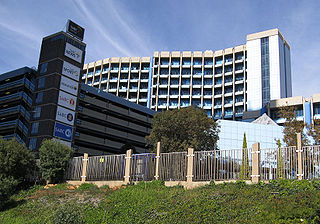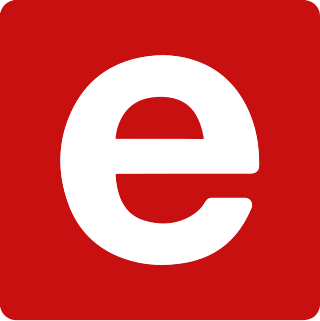Related Research Articles
Television broadcasting in Greece began in 1966, preceded in 1951 by statute 1963 permitting television broadcasting.
Sky Cinema is a British subscription film service owned by Sky Group. In the United Kingdom, Sky Cinema channels currently broadcast on the Sky satellite and Virgin Media cable platforms, and in addition Sky Cinema on demand content are available through these as well as via Now, EE TV and TalkTalk TV.

Television in South Africa was introduced in 1976. The country is notable for the late introduction of widespread television broadcasting.

The South African Broadcasting Corporation (SABC) is the public broadcaster in South Africa, and provides 19 radio stations (AM/FM) as well as six television broadcasts to the general public. It is one of the largest of South Africa's state-owned enterprises.
Pirate decryption is the decryption, or decoding, of pay TV or pay radio signals without permission from the original broadcaster. The term "pirate" is used in the sense of copyright infringement. The MPAA and other groups which lobby in favour of intellectual property regulations have labelled such decryption as "signal theft" even though there is no direct tangible loss on the part of the original broadcaster, arguing that losing out on a potential chance to profit from a consumer's subscription fees counts as a loss of actual profit.

The mass media in South Africa has a large mass media sector and is one of Africa's major media centres. While South Africa's many broadcasters and publications reflect the diversity of the population as a whole, the most commonly used language is English. However, all ten other official languages are represented to some extent or another. Afrikaans is the second most commonly used language, especially in the publishing sector.

e.tv is the first and only privately owned free-to-air television station in South Africa. It is the fifth terrestrial television channel in the country, following three channels that are operated by the state-owned South African Broadcasting Corporation and the privately owned subscription-funded M-Net. In 1997, the e.tv channel bought the broadcasting rights to broadcast English Premier League (EPL) matches and, later on, they also bought the rights to broadcast UEFA Champions League matches.
Digital Satellite Television, abbreviated DStv, is a Sub-Saharan African direct broadcast satellite service owned by MultiChoice and based and with headquarters in Randburg, South Africa. DStv provides audio, radio and television channels and services to subscribers across 50 countries, mostly in South Africa, Nigeria and Zimbabwe.

MultiChoice is a South African company that operates DStv, a major satellite television service in Sub-Saharan Africa, and GOtv, a minor service operating in over nine countries of this area and Showmax service. MultiChoice was formed out of the subscriber-management branch of the M-Net terrestrial pay television company, and broadcasts the full range of M-Net channels on the DStv service. MultiChoice is owned by the media conglomerate of the same name. One of the subsidiaries of MultiChoice is DStv Stream, formally DStv Now then DStv App, a service that delivers television transmission to mobile devices such as laptops, smart phones and notebooks.

Groupe Canal+, also known as Canal+ Group in English, is a French media and telecommunications conglomerate based in Paris, owned and controlled by Vivendi. It runs its own subscription TV channels in France, distributes third-party channels and services, and is a major source of finance for domestic film production, participating in the financing of the vast majority of films produced in France. It also has its own subsidiary companies with direct involvement in film production and distribution, such as StudioCanal. Apart from extensive operations in mainland France, the company owns many subsidiaries and operates in countries across Europe, Africa, the Asia-Pacific region, and in French Overseas Territories.

Disney Channel is a children's pay television channel owned and operated by The Walt Disney Company Limited, the international business division of the Walt Disney Company serving television markets across the Middle East, North Africa, Sub-Saharan Africa, Greece, Cyprus, the Baltics, and most of the Balkans.
Television in Italy was introduced in 1939, when the first experimental broadcasts began. However, this lasted for a very short time: when fascist Italy entered World War II in 1940, all transmissions were interrupted, and were resumed in earnest only nine years after the end of the war, on January 3, 1954.

Cape Town TV is a community television channel that broadcasts in Cape Town, South Africa. It launched in September 2008 with a one-year, "temporary" license and thereafter won another such license in September 2009. It is a non-profit organisation that is licensed as a community broadcaster in terms of South Africa's Electronic Communications Act.

Soweto Community Television (Soweto TV) is a South African community television channel broadcasting in the biggest township in South Africa, Soweto. The channel is free-to-air in Gauteng Province and it also broadcasts to South African subscribers on the DStv pay TV service on channel 251 and Starsat on channel 488.

TV Globo Internacional is an international pay television channel broadcasting from Brazil. It was launched on 24 August 1999 and it is owned by Grupo Globo.

Africa Magic is a collection of Pay TV entertainment channels that focus on African programming, most popularly Nigerian series and movies. Africa Magic, which started off as single channel of the same name, is a brand owned by M-Net and now comprises seven channels.
Disney Jr., officially Disney Jr. Europe, Middle East and Africa (EMEA) is a British-managed preschool pay television channel targeting younger viewers aged 2–7, owned and operated by The Walt Disney Company Limited, the international division of The Walt Disney Company serving Central and Eastern Europe, Western Europe, the Middle East and Africa. Launched on 1 June 2011 as a replacement for Playhouse Disney outside Africa and headquartered at Hammersmith, West London, it broadcasts in 11 languages.
DreamWorks Channel, commonly known as DreamWorks, is a pay television network owned and operated by the NBCUniversal International Networks division of NBCUniversal, a subsidiary of Comcast. First launched in Southeast Asia on 1 August 2015, it expanded to the rest of Asia as well as Europe, Africa and Oceania. Its programming is mainly sourced from DreamWorks Animation.
SABC Encore was a 24-hour free-to-air digital satellite and digital terrestrial television retro rerun channel created and owned by the South African Broadcasting Corporation, as a carriage deal between the SABC and Multichoice. This channel stopped airing at midnight on 1 June 2020 after MultiChoice's decision not to renew the channel once its contract had come to an end and was seemingly revived through DTT.
AstraSat was the South African Broadcasting Corporation's satellite television service that existed between 1996 and 1998. AstraSat carried SABC's three terrestrial television networks and two additional free-to-air channels that were aimed at becoming subscription channels. Numerous factors including the reliance on analogue instead of digital led to its closure in February 1998.
References
- ↑ "Don't Panic won't panic over porn row". Variety. 23 March 2003. Archived from the original on 22 January 2024. Retrieved 22 January 2024.
- ↑ "DON'T PANIC TV - ADULT VIDEOMOVIES PRODUCTION". Don't Panic TV. 3 October 2003. Archived from the original on 3 October 2003. Retrieved 22 January 2024.
- 1 2 "Emanuelle is tame compared with this..." IOL. 7 February 2003. Archived from the original on 22 January 2024. Retrieved 22 January 2024.
- 1 2 "F.A.Q." Don't Panic TV South Africa. 26 March 2003. Archived from the original on 24 June 2003. Retrieved 22 January 2024.
- ↑ "Sex channel here to stay". News24. 25 February 2003. Archived from the original on 22 January 2024. Retrieved 22 January 2024.
- ↑ "No sex, we're South African". News24. 5 March 2003. Archived from the original on 22 January 2024. Retrieved 22 January 2024.
- ↑ "Home". Don't Panic TV South Africa. 26 March 2003. Archived from the original on 10 April 2003. Retrieved 22 January 2024.
- ↑ "TV Guide". Don't Panic TV South Africa. 26 March 2003. Archived from the original on 24 June 2003. Retrieved 22 January 2024.
- ↑ "DON'T PANIC TV - ADULT VIDEOMOVIES PRODUCTION". Don't Panic TV. 14 August 2003. Archived from the original on 14 August 2003. Retrieved 22 January 2024.